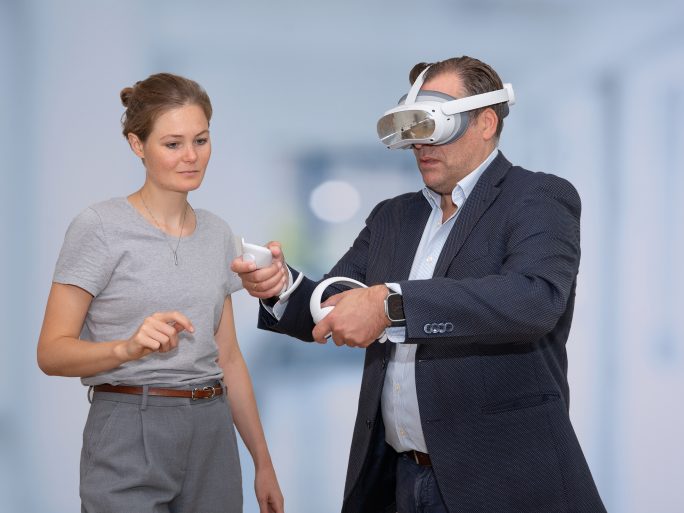Virtual Patients for Bonn University Hospital

T-Systems is developing a software solution to train nursing staff at Bonn University Hospital (UKB).
This software allows nursing trainees and staff to practice virtual nursing care scenarios in both the general ward and the postnatal ward. The system creates virtual patient rooms, avatars of both adult and infant patients, and the corresponding nursing tasks. Nursing staff use virtual reality goggles and hand controllers to interact with the virtual environment. Artificial intelligence provides the patients with voices and spoken text. The solution offers eight scenarios, ranging from wound care and monitoring vital signs to counseling on newborn care.
Virtual Reality Goggles and Controllers
The solution consists of a computer platform that visualizes various scenarios and learning modules. Trainees access the system through a training kit, which includes virtual reality goggles and controllers, a tablet for the trainer, and a module for mobile phone connectivity. Participants run through simulations, practice action sequences, interact with patient avatars, and make decisions. Trainers can guide learners directly and monitor their progress without being physically present in the same room—or even the same country.
“With Metaverse solutions like these, we can train nursing staff more effectively,” says Christoph Sebastian Nies, Head of School and spokesperson for UKB’s Centre for Education and Training. “Trainees receive practical, scalable training units and can’t do anything ‘wrong’ in the virtual worlds. This boosts their confidence and prepares them for their careers.”
Nursing Care with State-of-the-Art Technology
Gottfried Ludewig, responsible for the healthcare division at T-Systems, says, “Virtual environments offer many advantages when it comes to training or preparing for specific patient scenarios. A variety of situations can be repeated easily, cost-effectively, and as often as necessary. It’s a step toward care that is optimally prepared for its vital role using cutting-edge technology.”
UKB also plans to use this virtual reality solution for training international nursing staff. Trainees will be able to interact with patient avatars, communicate within the learning scenarios, and experience elements like feeling a virtual patient’s heartbeat through the controller. This will enable joint learning and simulation experiences across national borders.